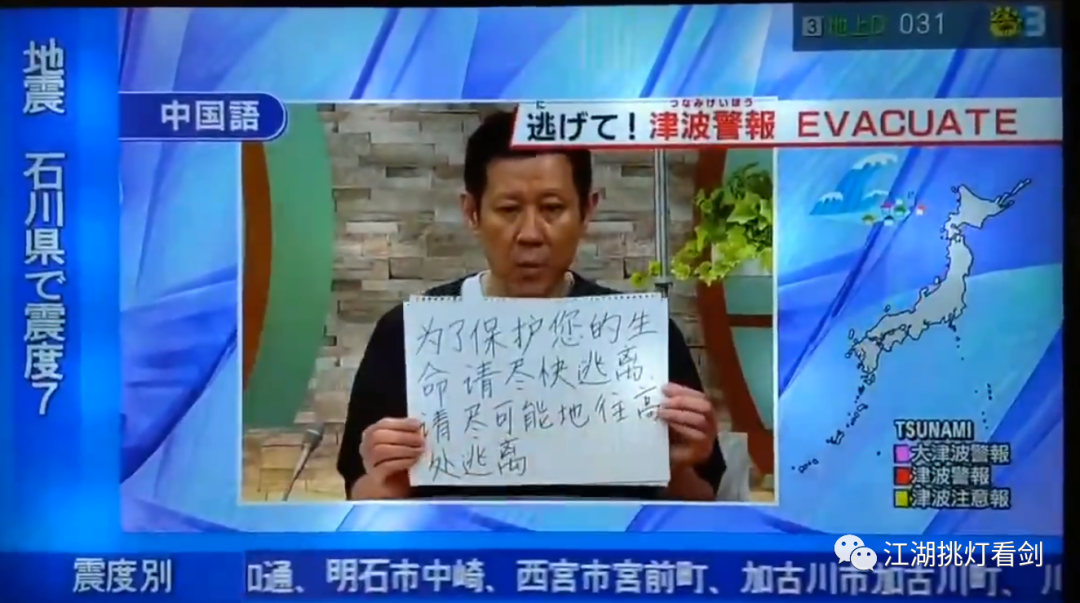“Rejoicing over a disaster (or mocking or insulting the victims of disaster) in this way makes the citizens of this great nation infinitely less civilized.”
– From an essay by WeChat blogger 江湖挑灯看剑 (Jiānghú tiǎo dēng kàn jiàn), criticizing displays of Schadenfreude on Chinese social media after a major earthquake struck Japan on New Year’s Day [Chinese]
After a magnitude 7.6 earthquake struck the Noto Peninsula on the western coast of Honshu, Japan’s largest island, on New Year’s Day, there was some unpleasant rejoicing on Chinese social media. Some widely viewed comments included: “Disaster strikes Japan, and everyone approves,” “Today is a good day,” “The first joyous event of 2024,” and “2024 is off to a great start!” Xiao Chenghao, a news host for Hainan Broadcasting Station (HMG), was suspended from his job after a social media post in which he crowed, “Is this retribution? Japan hit by a magnitude 7.4 [sic] earthquake!” Xiao’s suspension was a trending news topic on Weibo, and a related hashtag was viewed over 140 million times. (His recent videos were deleted, but his accounts have not been banned.) After the Chinese Ministry of Foreign Affairs (MOFA) offered condolences to Japan over the quake, MOFA’s social media accounts were reportedly flooded with angry comments from Chinese nationalists, who felt the condolences were inappropriate, given the fraught history between Japan and China, as well as Japan’s recent release of treated wastewater from a nuclear power plant that was damaged in the 2011 Fukushima earthquake and tsunami. “The Ministry of Foreign Affairs has no right to forgive Japan on behalf of the Chinese people,” wrote one incensed commenter. On Douyin, the comment sections below video news reports about the MOFA condolence message have reportedly all been disabled.
There was also a fair amount of pushback from Chinese online commenters and bloggers who found these open displays of Schadenfreude distasteful, especially given the scale and human toll of the disaster. Thus far, the affected area in Japan has experienced more than 100 aftershocks, 62 people have died, many more are still missing or trapped in collapsed buildings, and rescue efforts are ongoing. The tremblor also caused a fire in the city of Wajima, and tsunami warnings were issued for coastal areas, although those warnings have since been lifted.
The following day, on the tarmac at Tokyo’s Haneda Airport, a Japanese coast guard plane en route to provide earthquake relief strayed onto a runway without clearance for take-off and collided with a Japan Airlines passenger jet with nearly 400 people on board. The jetliner caught fire, but in what has been described as a “miraculous” rescue effort, all of the passengers and crew of the jetliner were safely evacuated, with only minor injuries. Five of the coast guard plane’s six crew perished.
On January 2, a Weibo post by a user with 170,000 followers declared, “Whenever an earthquake strikes Japan, any normal Chinese person ought to rejoice, and gloat at their misfortune.” This resulted in an outpouring of criticism in the comments section of the post, with many Weibo users vowing that if such cruel sentiments were the norm, they would happily consider themselves “abnormal.” CDT editors have compiled and translated some of these comments from Weibo and Chinese-language X (formerly Twitter):
lairifa42320604: If this is normal, then I’d rather be abnormal.
unnamed_pooh: “Rejoicing [in others’ misfortune]” and “gloating” both have strong negative connotations.
无解之姐:Then I am not normal and I do not support your point of view. I have been to Japan and the people there were very friendly to me. They are just ordinary people, civilians.
Zhaosy9: Show some humanity. Which country you come from isn’t that important—it’s how you behave as a human being that matters.
娃娃-女王vivienll:Applauding others’ misfortune is the basest, most despicable behavior of all. If this counts as normal, I’d rather be abnormal.
一粒尘土上的世界:The most abnormal Chinese person is you.
乐游原上草:You may be abnormal, but don’t drag us down with you. The vast majority of Chinese people haven’t been dehumanized to that extent …
葬送的菲倫:Populism will only bring about disaster. I don’t want China to make the same mistakes that Japan and Germany did in the past.
Ahkau:Russia was also burning, killing and looting in Northeast China at that time in history. Why don’t you hate Russia?
M_Heisenberg: Seeing that the comments section is full of people scolding you makes me feel relieved. [Chinese]
WeChat blogger 江湖挑灯看剑 (Jiānghú tiǎo dēng kàn jiàn) wrote an essay criticizing expressions of knee-jerk nationalism and Schadenfreude in response to Japan’s natural disaster:
Tragically, these same people would not speak out for the eight Wuhan citizens who were investigated and punished four years ago [for exposing the emerging coronavirus pandemic]. Nor are they willing to fight to defend their own rapidly disappearing rights, much less stand up to protest injustice. The only way they can show off their “skills” is by going online and cursing neighboring countries.
It is indescribably sad that the citizens of this great nation would behave in such a ridiculous manner. One fact they may be unaware of is that Japanese TV stations were so worried that Chinese residents might not understand the evacuation announcements on the Japanese-language news that they broadcasted images of handwritten Chinese signs warning all residents to evacuate from the danger zones.
In comparing these two approaches, the difference is immediately clear, and therein lies the difference between civilization and barbarism.
[…] Rejoicing over a disaster (or mocking or insulting the victims of disaster) in this way makes the citizens of this great nation infinitely less civilized.Oddly enough, the most appropriate response came from a netizen in Gansu who had recently experienced an earthquake himself. He said, “I hope there will be no earthquakes anywhere, and that everyone will have a safe and peaceful New Year.” [Chinese]

For more on anti-Japanese sentiment in China, and critical reactions to it, see the “U-lock” entry in our new Lexicon ebook.







